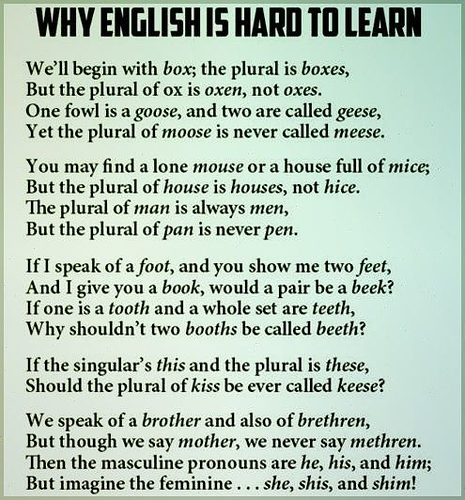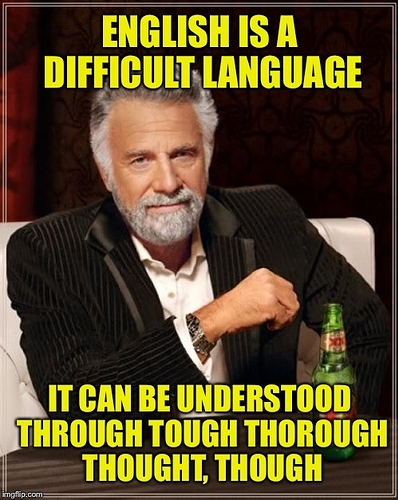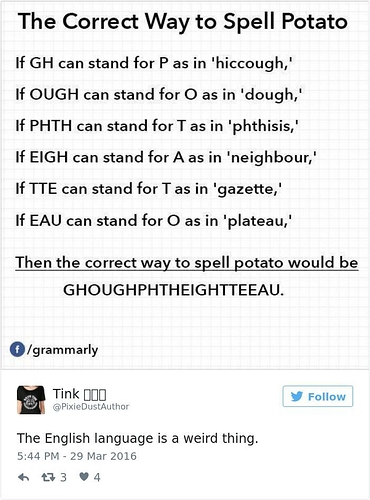English spelling doesn't make sense to me at all. In my native language, Arabic, there is an explanation on why you'd use a certain spelling of a word in a sentence, words are usually spelled the way they're pronounced unless there is a specific reason. It's all based on rules, and while the rules are difficult to learn at least when you ask why a word is spelled that way there is a reason for it.
While in English... whats the point of silent letters?
Spelling that makes no sense, why is Conscience spelled with "Science" is the pronunciation is completely different? There are so many examples of really weird spelling that I feel are there for no reason, spelling is based not on understanding of the language but based on memorizing it.
Here is the lowdown on why spelling is o difficult in English. The language has always had a characteristic of absorbing words from other languages. During medieval times when British royalty was more French and German than Anglican (meaning British here), English was soaking up words from all the European languages plus Latin. There was no correct spelling of anything back then. Nobody cared.
Around the late 1600s and early 1700s (and I think that was the time frame), that changed. A group of school teachers all around England decided that they would codify the written language with specific rules of grammar and specific spellings. They called themselves the Inkpot Linguists.
These guys decided among themselves that the proper spelling of each word should be based upon its spelling in its original language. French, Old English, and Latin have different ways of spelling the same sounds, you see. In some cases, the Inkpot guys guessed wrong about the origin language of words. Basically, they screwed up everything.
I actually prefer it when languages spell out the tense for you with conjugations. Like, when I'm translating from Japanese line by line, there are times when every line is just 'wut? um, okay' until I get halfway through the passage and FINALLY all the stuff before it makes sense and I feel like breaking my forehead on my desk.
As it stands, I can't even imagine holding my own in a spoken conversation with that kind of comprehension lag...I guess I'll just have to keep practicing. ;_;
I had to do the opposite when I learned French. ^^ The one I CONSTANTLY forget is anything with manquer, like "tu me manques". That means..."I miss you", not "you miss me", right?
Frick...I'm not even sure anymore...
Truer words have never been spoken...English spelling is all about memorization. It's why there are so many grown adults, raised with the language from birth, who still can't spell. If you don't take the time to work at it, you're not likely to pick it up organically. :[
Tbh I am an English speaker and haha why is nothing pronounced how it reads? I'm a really bad speller. A really reaaaally bad speller (computers have saved my life) I often have to sound things out phonetically to spell them, which is a pain because my vocab has always been away ahead of my spelling. I just want things to follow rules.
Dave Gormen does a wonderful piece on this with Loughborough, how many different ways you can actually pronounce that because of the damn ough and if you follow the rules you can genuinely pronounce is Lowbrow (it's pronounced Luffbura). Other wonderful examples in Cirencester pronouced Sirencester, Towcester pronounced Toaster, Leicester pronounced Lesster, and Leominster (which I have been pronouncing as it reads all my life) is actually Lemstar. (Place names are a particular issue to me because I work at the post office). I just want things to follow rules I can spell out phonetically please.
The rules in English language that apply but don't apply all the time. Like... I before E, except after C.... except for these 6000 words that don't follow that rule https://en.wiktionary.org/wiki/Category:English_words_not_following_the_I_before_E_except_after_C_rule1
Acronyms. Specifically how half of them are pronounced as initials and the other half as words.
Pluralizing or lack of pluralizing is a big issue I have, and then when I do remember I do it on words that don't need to be pluralized. Like "I love eating the shrimps"
Word being used many times in a row but is still correct English.
Words that are spell the same but don't mean the same thing. OR the word has a different word in Canadian/British English but uses the same word in American English. (Cheque is check in American English, but the word check is already used for other MULTIPLE meanings so WHY are you adding yet another?? I don't understand???)
I pronounce everything wrong. Fk the word "Arkansas" Why does Americans hate using accents to help with how a word is pronounced?? I don't understand. The only word you seem okay with using it on is "pokémon" I mean you HAVE these letters but they are never used??? Why. Why? WHY????
Bonus points because I was taught Canadian English (broken because both my parents know English as a second language) and not American English (with Canadian English being closer to British English but NOT being British English) so I was VERY confused when I first got online and most of the people I talked to were American and telling me I was using English wrong with the issue being BOTH my English was broken AND I was using the wrong English =/
EDIT: Short forming / purposely using the wrong words to be cute or charming.
And not really the act, but the attitude towards it. Like its okay if a native English speaker writes a message like "I no u luv me 4 who I is" If I were to do something like that I get attacked for my bad English.
A lot of English words are derived from Latin, so studying Latin actually helps with understanding tons of English words. I think the silent letters in words just helps with separating it from other words that either sound exactly the same or are spelled nearly the same. Like "knight" and "night". That's the only example I can think of right now xD English is silly.
I am not a native English-speaker and have learned English from a very young age. To be honest, learning English is not too hard since I am able to ace most of the English tests in class. But when it comes to application, such as writing and speaking, I struggle so hard and make mistakes that I am not aware of it until someone points it out for me. It is probably the tense (past, present perfect, etc) giving me the hardest time since I don't know when to use which tense or not in some situations, especially when writing a story.
I've studied English for at least thirteen years and I'm currently majoring in English in university but I still don't understand prepositions. My language doesn't use prepositions so they just confuse me so much, especially if the preposition in English is different compared to what my language uses. For example in Finnish we'd say "in the television" instead of "on the television" and "walk on the sand" instead of "in the sand", so those confuse me a lot.
Pronunciation and spelling can also be tricky, especially with new words I've never seen/heard before. Since we pronounce everything like it's written and vice versa, the silent letters and several different ways to pronounce the same letter can be pretty confusing.
Also, sentence structure. Finnish is really flexible in the sentence structure; you can basically put any word at any place in the sentence and it still makes sense, sadly not the case in English. So sometimes I write in English but have a Finnish sentence structure, like just now as I was talking with my friend I wrote:
"The small lights work well to light the room but for taking pictures not very good." which would work in Finnish but sound awkward in English. Also in Finnish you don't necessarily need the personal pronoun in the sentence because you can see the person from the verb (minä syö n - I eat) so sometimes I forget the personal pronoun from my sentences in English.
Oh my gosh, British English is such a nightmare and a half; just looking at those makes me want to cry...in American English, usually the only one of those you run into is Worcestershire (for the sauce), which I am eternally forgetting how to pronounce.
I'm not entirely sure that we "have" those letters per se. By that I mean that they exist simply so that different languages can be transliterated into the Roman alphabet, which is not exclusively used by English-speakers. We do hate accents for some reason, but French speakers, for instance, don't, and will even throw accents into foreign words to help with pronunciation.
That's why I put the word "have" in quotation marks. It's not that they literally don't exist in the English language, it's just that they aren't really relevant to English speakers, at least in American English.
For instance, when we make up words on the spot (like Dr. Seuss or Shakespeare), we don't usually stick accent marks in them, even if they could fit and/or make the pronunciation clearer.
Why don't we? Because we just don't see them as a normal part of our language. But it's all just convention; all subject to change in the distant future...
To me the hardest thing about learning English was that you pronounce the words differently than you write them. Now a lot of native English speakers asked what I am talking about, but listen, slavic languages pronounce letters differently, and we DON'T have silent letters.
For example you have the word "queue" which you pronounce simply "Q", but a Polish person will read ALL the letters in that word, so we'd say "Q-weh-weh". Because we never heard about silent letters in a word before.
English has a lot of nuances like that.
Don't let me start on how many times I confused W with V, because we don't have V in our alphabet either. Where I come from W/V are pronounced the same.
I simply couldn't see the difference between "never / newer", "lover / lower" etc
But right back at you you, because you guys have no idea what's the difference between ś/si/sz is or why we have 3 different Z's in our alphabet (Z, Ź, Ż) lol
Second hardest thing is pronounciation itself. Polish has a lot of words that have a variety of "sh" sounds in them, and some of them don't even exist in English. Polish is a very rough sounding language. Our tongue positioning while speaking is different than in English, so I feel like my tongue will knot while speaking English XD
It's like trying to talk to aliens or eldritch gods XD
Then there's accent. You guys pur emphasis on the syllabes in different places than Polish, same goes to sentences. And when done wrong, in every language, it's hard to recognize a word correctly.
o boy time for some of my favourite english language jokes
and the following:
“Let’s face it - English is a crazy language. There is no egg in eggplant nor ham in hamburger; neither apple nor pine in pineapple. English muffins weren’t invented in England or French fries in France. Sweetmeats are candies while sweetbreads, which aren’t sweet, are meat. We take English for granted. But if we explore its paradoxes, we find that quicksand can work slowly, boxing rings are square and a guinea pig is neither from Guinea nor is it a pig.

The last bit is a bit dishonest, though, as general knowledge explains these words easily: Eggplants because the first varieties to be commonly available in NA were the little egg-shaped ones; the name hamburger is coming from the city of Hamburg, pineapple because they look somewhat like pine cones, and apple used to be understood as a generic word for fruit, etc etc...
tbh English is a pretty easy/basic language but somehow English native speakers don't like to hear that. ^^
As a German native I think we had mostly trouble with the pronounciation in school because we oftentimes have very similar-looking words but our vowels work like before the Vowel ShiftTM, plus we don't have such a language stew which also changes up the pronounciation and grammar depending on the word's origin. I personally had a very hard time learning to understand American accents because of their pronounciation if it wasn't Leonard Bernstein talking, and I still have trouble, though not to such an extend as 3 years ago. (Mid-West is a completely different case, though.)
The grammar is very similar generally speaking (especially if you look at Shakespearean or even earlier English - I never had trouble with the who/whom/whose or thee/thy/thou because that's basically exactly like German) but that also throws Germans off a lot too because not everything is 100% the same, especially with the very modern subject-predicate-object order (I think it derivated from the roman languages...? tell me if I'm wrong, though) and other casualties. German has a very flexible syntax where the predicate has to be in second place and that's basically it so while speaking it's sometimes hard that English doesn't have that liberty. We also throw around with commas (there's a system, mind you) whereas English tries to discard them asap, and that you can't just stack words together to make new ones but have to learn a whole completely new word or use super long rows of words with prepositions etc. is maddening too. Also makes me unsure of when to actually combine words and whether it is like in desktop, good-looking, or blueberry muffin.
What also throws me off to this day is when it comes to idioms and stuff like that because a lot are very similar but changed one or two words, so I often get confused which one belongs to which language.
but uhhhh yeah... Germans oftentimes translate sentences very literally at the beginning because the languages are so close.
OH AND THAT YOU DON'T HAVE A POLITE/FAMILIAR YOU THAT'S LIKE. SO WEIRD. And a small thing that is kinda bothering me personally is that you don't have a real equivalent of "ich hab dich lieb" which is kinda the platonic version of "I love you" but "I love you" doesn't quite hit the child-like innocence and genuine and soft feeling from the German phrase. (but now I'm getting nit-picky)
- disclaimer that I'm speaking/learning this language for over a decade now and didn't really have a lot of issues with it to begin with but that's what I've seen a lot with peers. I was just really lazy with learning vocabulary and at some point ran into the problem that German allows more complex syntax to still make sense while with English it's just... too much at some point.
This post was flagged by the community and is temporarily hidden.
As a native English speaker I just want to apologize to anyone trying to learn it for the high number of exceptions and outliers in our vocabulary when it comes to grammar rules (probably one of the hardest things to learn, even for native speakers)
It's what happens when you have a language that's in the Germanic language family being heavily influenced by a romance language
Suggested Topics
| Topic | Category | Replies | Views | Activity |
|---|---|---|---|---|
| What name sounds better | Questions | 13 | 318 | Nov '24 |
| Organic traffic | Questions | 0 | 191 | Jul '24 |
| I need help finding a story. It’s driving me crazy | Questions | 3 | 259 | Sep '24 |
| Ad revenue : how does it work? | Questions | 10 | 674 | Sep '24 |
| Renaming your Series, a good idea? | Questions | 4 | 189 | Dec '24 |



